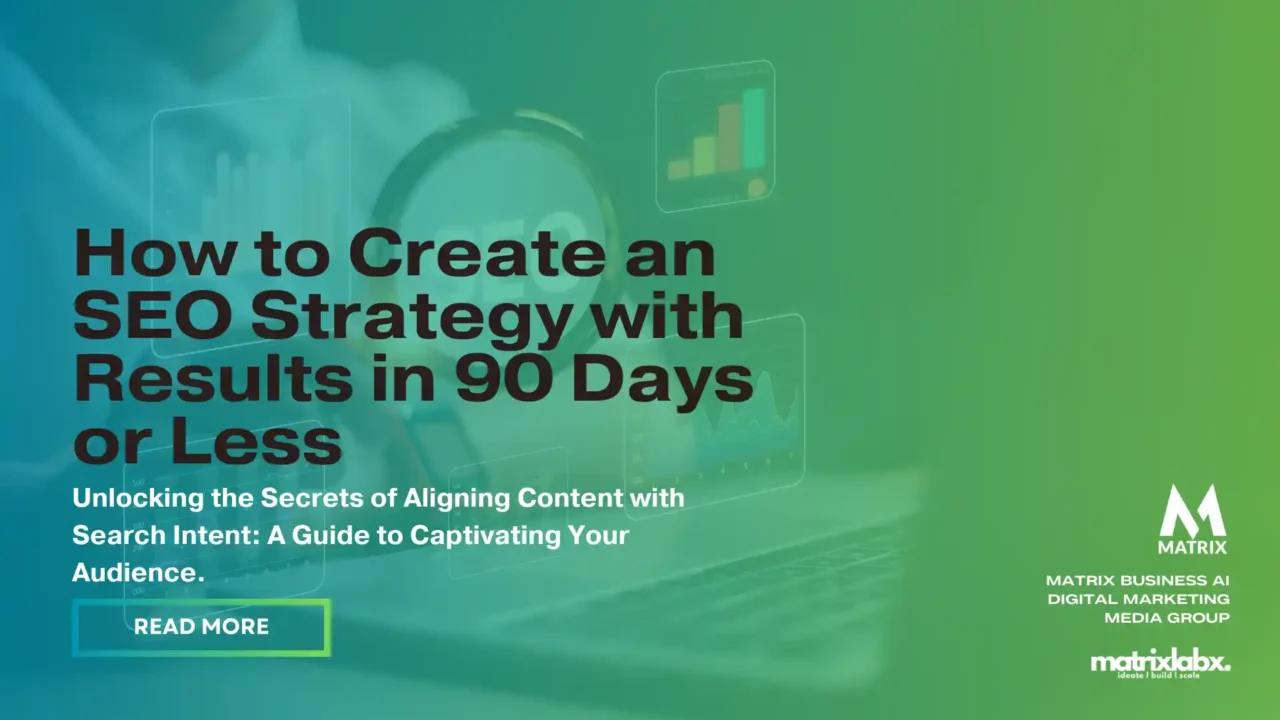Create an SEO strategy with results in 90 days or less
Learn how to create an SEO strategy with results in 90 days or less.
SEO, or search engine optimization, is improving the ranking of a website on search engines. A good SEO strategy can help your website attract more visitors and customers. Are you ready for 2025?
In the bustling heart of Silicon Valley, amidst a sea of tech giants and startups, a promising e-commerce company named Zenith Tech resided. Zenith Tech was the brainchild of a visionary entrepreneur, Alex, who saw immense potential in the burgeoning online marketplace. However, Alex’s expertise lay in technology, not marketing, and he soon found himself grappling with the intricacies of search engine optimization (SEO).
Alex entrusted the mantle of SEO to his newly appointed CMO, Sarah, a seasoned marketing professional with a proven track record. Sarah, however, underestimated the complexities of SEO and overlooked several crucial best practices. She failed to conduct thorough keyword research, resulting in poorly optimized content that failed to capture the attention of search engines. Additionally, Sarah neglected to build backlinks, the digital equivalent of recommendations essential for boosting website authority.
Due to Sarah’s oversight, Zenith Tech’s website traffic plummeted. Leads from the website dwindled, and sales stagnated. Alex, alarmed by the declining numbers, confronted Sarah, who, in a desperate attempt to rectify the situation, resorted to black-hat SEO tactics. These unethical methods, such as keyword stuffing and link farms, temporarily boosted rankings but ultimately backfired, leading to Google penalties and further damaging Zenith Tech’s online reputation. How to Choose the Right AI Digital Marketing Agency: A Comprehensive Guide for Marketing Managers
Alex knew he needed drastic measures to restore Zenith Tech’s ruined SEO. He turned to AI, seeking a solution that would propel Zenith Tech to the top of search results.
AI-powered SEO tools offered a range of solutions, including:
- Keyword Research and Optimization: AI algorithms can analyze vast amounts of data to identify relevant keywords with high search volume and low competition. This data can then be used to optimize website content, meta descriptions, and internal linking structures.
- Content Creation: AI can assist in content creation by generating outlines, suggesting relevant topics, and even providing initial drafts. This can save time and resources while ensuring that content is aligned with search intent and user preferences.
- Technical SEO Analysis: AI can identify technical issues that may hinder website crawling and indexing. This includes page load speed, mobile-friendliness, and site structure.
- Backlink Acquisition: AI can help uncover high-quality backlink opportunities by analyzing the backlink profiles of top-ranking websites. It can also suggest relevant websites for guest blogging and influencer marketing campaigns.
- Rank Tracking and Monitoring: AI can continuously monitor website rankings and provide insights into the effectiveness of SEO efforts. This data can be used to identify areas for improvement and make data-driven decisions.
Zenith Tech regained its lost ground by implementing these AI-powered SEO solutions and even surpassed its previous SEO performance. The website’s organic traffic skyrocketed, leading to a surge in leads and sales. Once again optimistic about Zenith Tech’s future, Alex hailed AI as the savior of his company’s SEO strategy. SEO Pricing Guide: How Much Does SEO Cost In 2025?
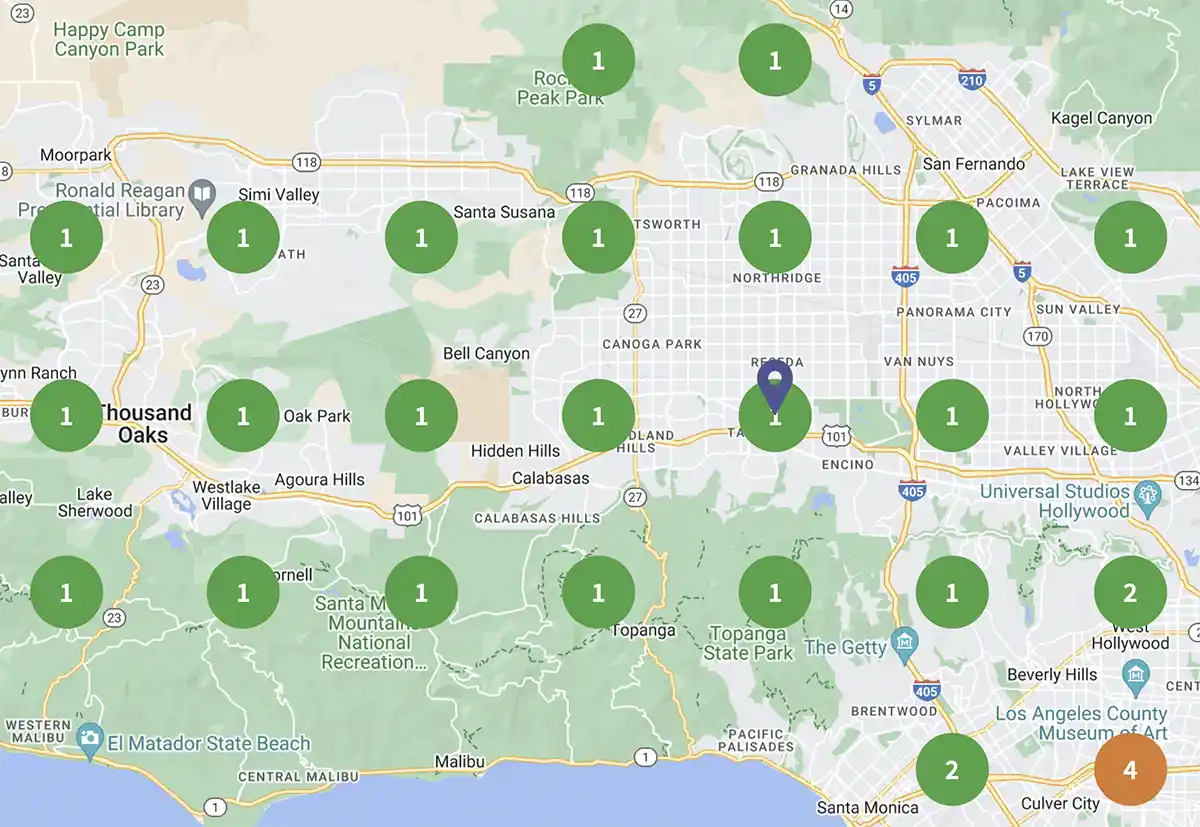
Your CEO enters your office and asks why no leads are coming in from your website. What do you tell them you don’t know because you don’t even know how much traffic you get at your website or what conversion rates they should be?
You should be able to tell your CEO that I’ve got 62,000 visitors per month at a 5% capture rate into marketing-captured leads. So she jumps back and says, ” Okay, that’s 3,000 marketing-captured leads, right?” You pipe up, yes, that’s correct.
Okay, from those 3,000 MCL, how many of those close into sales? If your reply is to ask sales, you’re in trouble. 10 Most In-Demand Types of SEO Services to Focus On in 2025
Your Blueprint for SEO Success in 2025
Whether you’re a business owner, marketer, or seasoned SEO professional, this guide is tailored to give you a competitive edge in the evolving digital landscape. Get SEO Pricing.

Everyone is talking about ChatGTP and wants to know the impact of AI-driven content generation. What is Google’s view?
Google’s policy on AI-driven content is that it is not against its guidelines as long as it is not used to manipulate search rankings. AI-generated content can be used for various purposes, such as creating news articles, generating marketing copy, or writing fiction. However, if AI-generated content is used to create fake reviews, spam, or other manipulative content, Google may penalize it. Speed is key.
Most people don’t even know how their website ranks regarding speed performance. Because if I have to wait more than three seconds, I’m out of there right
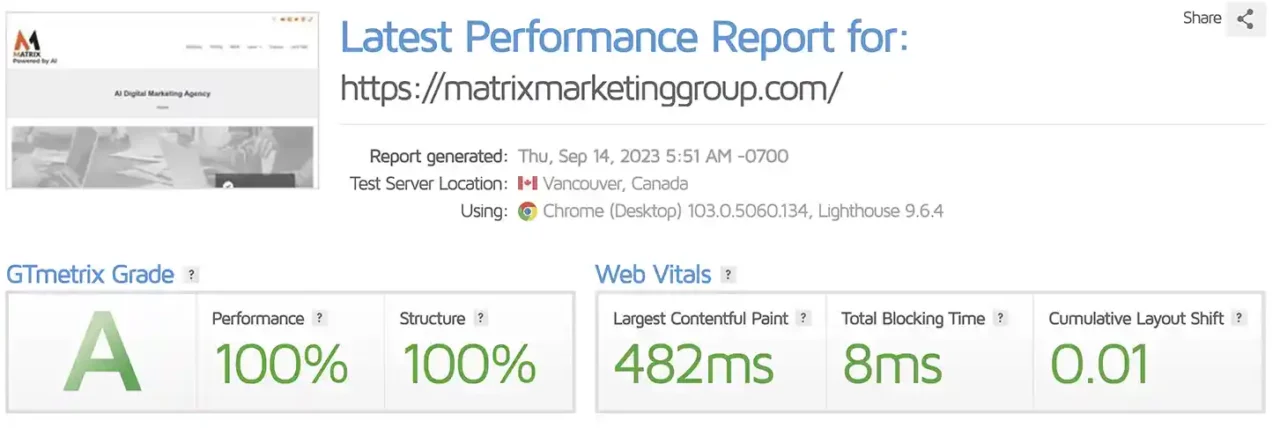
When was the last time that you checked your performance report? You can do it right here. It’ll take less than 10 seconds. Check your site for free on Google.
Here are some specific examples of AI-generated content that Google allows:
- News articles that are generated by AI but are based on real-world events and data.
- Marketing copy that is generated by AI but is still relevant and helpful to users.
- Fiction that is generated by AI but is still creative and engaging.
Here are some examples of AI-generated content that Google may penalize:
- Fake reviews are generated by AI to boost the ratings of a product or service.
- Spam that is generated by AI to promote a website or product.
- Content that AI generates to deceive users or manipulate search results.
Ultimately, Google aims to provide users with high-quality, relevant content. If AI-generated content can achieve that goal, Google is open to it. However, if AI-generated content is used to deceive or manipulate users, Google will remove it from its search results.
Here are some additional things to keep in mind about Google’s policy on AI-generated content:
- Google’s algorithms constantly evolve, so staying up-to-date on the latest guidelines is important.
- If you are unsure whether your AI-generated content complies with Google’s guidelines, contact Google for clarification.
- It is important to use AI-generated content responsibly, which benefits users and does not harm the search experience.
You should be able to say Hey, out of these 3,000 marketing captured leads, we close roughly 18%. Additionally, we have marketing funnels that we’re looking at weekly for bottlenecks within each stage to focus on increasing lead cycle times and deal sizes. That’s a winning statement. Content Marketing Financial Firms
How long does it take for a new website to see 25,000 website visitors?
The time it takes for a new website to see 25,000 visitors can vary depending on several factors, including its niche, target audience, marketing efforts, and search engine optimization (SEO). However, on average, it takes new websites around 6 to 12 months to reach 25,000 visitors per month.
Here are some of the factors that can affect how long it takes a new website to reach 25,000 visitors per month:
- Niche: Websites in niches with high competition, such as finance or health, may take longer to reach 25,000 visitors per month than websites in less competitive niches.
- Target audience: Websites targeting a specific audience, such as business professionals or stay-at-home moms, may reach 25,000 visitors per month more quickly than websites with a broader target audience.
- Marketing efforts: Websites that are actively marketed, such as through social media, email marketing, and paid advertising, are likely to reach 25,000 visitors per month more quickly than websites that are not marketed.
- SEO: Websites that are well-optimized for search engines are more likely to show up in search results, which can lead to more visitors.
2025 ALERTS: The Chatbot Era has Ended
Our recent market research shows that 85% of marketing agencies need more in-house expertise to manage and deploy multi-AI agent systems effectively.
If you are a new website owner, there are many things you can do to increase your chances of reaching 25,000 visitors per month:
- Create high-quality content that is relevant to your target audience.
- Promote your website on social media and other online channels.
- Use email marketing to stay in touch with your audience.
- Optimize your website for search engines.
- Submit your website to directories.
- Run paid advertising campaigns.
You can reach your monthly goal of 25,000 website visitors with hard work and dedication. Rethinking AI Website Design in the Age of the Algorithm
You could give her this report that shows how you stack up against the competition.
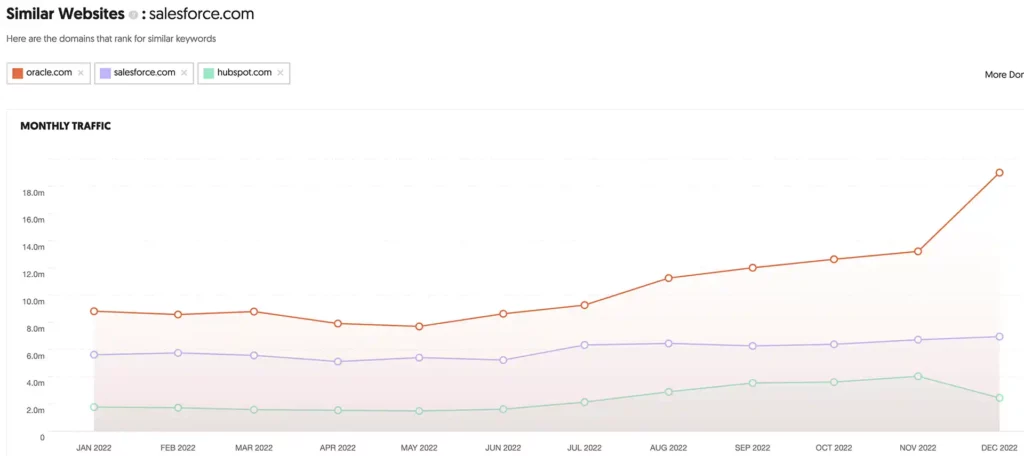
This article will discuss the steps you need to take to create a successful SEO strategy for your business and get results in 90 days or less. So what are you waiting for? Get started today!
Are you looking for ways to improve your website’s ranking on search engines?
SEO, or search engine optimization, is improving the ranking of a website on search engines. This article will discuss steps to create a successful SEO strategy for your business and get results in 90 days or less. Get started today!
You can see amazing results in 90 days by following our simple steps. Our strategies are easy to follow and don’t require any special skills or knowledge. You must improve your website’s ranking on search engines and attract more visitors. Get started today and start seeing results! Top 7 Challenges Facing SEO Managers in 2025
- See our NEW SEO guide.
- SEO techniques
- SEO Tips are found below.
- SEO tools and BARD for AI SEO
- SEO best practices
- SEO for beginners to get started
- SEO for startups
What is SEO?

Remembering a few key things when creating a successful SEO strategy would be best. AIContentPad is designed to help you get noticed with better user-friendly content.
First, you need to understand how search engines work. This will allow you to optimize your website more effectively.
Second, you need to focus on both on-page and off-page optimization. On-page optimization refers to the techniques you use on your website to improve its ranking. In contrast, off-page optimization refers to the techniques you use outside your website to increase visibility.
Finally, you must ensure you are constantly working to increase traffic to your website. The more visitors you have, the better your chances of ranking high in search engine results in pages (SERPs) and attracting more customers. Automated Keyword Discovery: A Game Changer for SEO
Start creating an effective SEO strategy for your business; here are some tips to help you get started:
- First, perform an SEO audit of your website. This will allow you to identify areas where your site could be improved, such as the quality and frequency of content, the structure of your URLs, technical issues preventing search engines from crawling and indexing your website properly, etc.
- Next, familiarize yourself with the basics of SEO. This includes learning about keyword research, content optimization techniques (such as using keywords in titles and headers), how links affect search engine rankings, etc.
- Once you have a basic understanding of these concepts, focus on on-page optimization. This involves optimizing your website for users and search engines by incorporating keywords, metadata, and internal links into your content.
- In addition to on-page optimization, you should also focus on off-page optimization techniques such as building high-quality backlinks from relevant websites and writing guest posts for relevant blogs.
- Finally, make it a priority to work on increasing traffic to your website over time. You can use many strategies to drive more visitors to your site – including running paid ad campaigns, participating in social media marketing, and creating shareable content – so choose the best tactics for your business. By following these steps, you can create a successful SEO strategy that will help improve your website’s ranking and visibility, attract more traffic, and ultimately boost your bottom line. So what are you waiting for? Get the SEO plan template today!
70% of agencies need help integrating AI solutions.
70% of agencies need help integrating AI solutions into their tech stack, citing a lack of interoperability as a major barrier. 85% of marketing agencies need more in-house expertise to manage and deploy multi-AI agent systems effectively.
What activities and level of experience do you need to manage SEO for a $100M manufacturing brand?
Sure, here is a breakdown of the activities and level of experience needed to manage SEO for a $100M manufacturing brand:
Activities
- Keyword research and analysis: Identify relevant keywords that potential customers use to search for products or services related to the brand.
- Content creation and optimization: Develop high-quality content optimized for target keywords and tailored to the brand’s target audience.
- Technical SEO: Ensure the website is technically sound and optimized for search engines, including website speed, mobile-friendliness, and schema markup. Creating an effective SEO strategy for your business is very important and requires experience.
- On-page optimization: Optimize individual web pages for specific keywords, including page titles, meta descriptions, header tags, and image alt text.
- Link building: Build high-quality backlinks from reputable websites to improve the website’s authority and credibility.
- SEO reporting and analysis: Track and analyze SEO performance metrics to measure progress and identify areas for improvement.
- SEO strategy development: Develop and implement a comprehensive SEO strategy that aligns with the brand’s overall marketing goals.
Level of Experience
- 7+ years of experience in SEO: Possess a strong understanding of SEO principles, best practices, and algorithm updates.
- Proven track record of success: Demonstrate a history of achieving measurable SEO results for previous clients or projects.
- Experience with enterprise-level SEO: We have experience managing SEO campaigns for large, complex websites with multiple product lines or services.
- Understanding of the manufacturing industry: Knowledge of the industry, including key terminology, trends, and target audience.
- Excellent analytical and problem-solving skills: Analyzing SEO data, identifying trends, and developing solutions to improve performance.
- Strong communication and collaboration skills: Ability to communicate effectively with internal stakeholders, such as marketing and sales teams, to ensure alignment and achieve common goals.
In addition to these technical skills and experience, an SEO manager for a $100M manufacturing brand should also have the following qualities:
- Strategic thinking: Ability to think strategically and develop long-term SEO plans that align with the brand’s overall business objectives.
- Creativity: Ability to think creatively and develop innovative SEO strategies that stand out.
- Adaptability: Ability to adapt to changing SEO landscapes and algorithm updates.
- Attention to detail: Ability to pay close attention to detail and ensure that all SEO work is executed flawlessly.
- Passion for SEO: Have a genuine passion for SEO and stay up-to-date on the latest trends and techniques.
How to Perform an SEO Audit
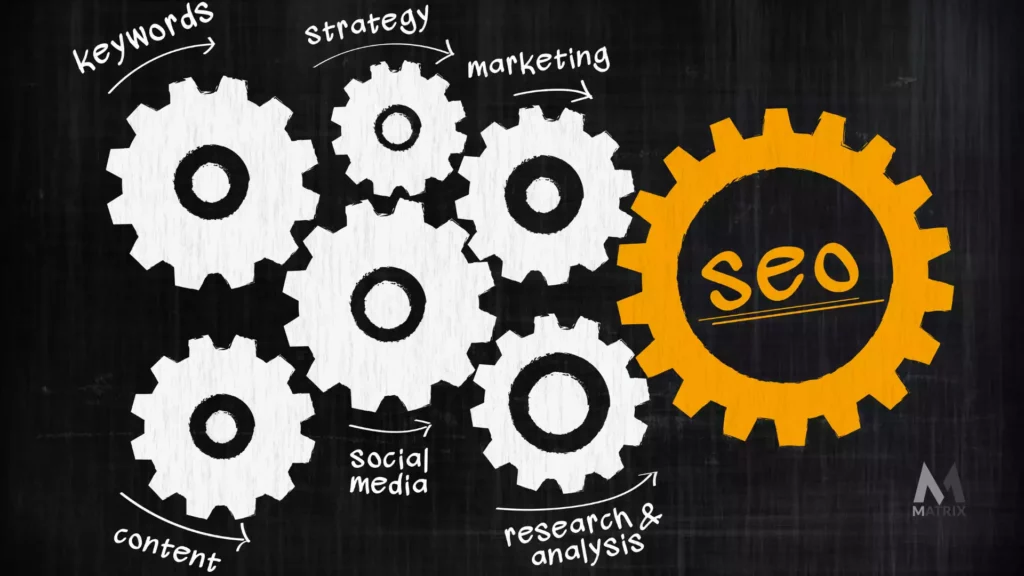
An SEO audit evaluates a website to identify areas for improvement and increase its rank on search engines.
The first step in performing an SEO audit is to assess the website’s current ranking on search engines. This can be done using various tools, such as Google Search Console or RankMath. After that, be sure to draft your 6 month SEO plan too.
Once you know how the website performs, you can evaluate the factors contributing to its ranking. This includes the quality and frequency of content, the structure of URLs, the use of keywords and metadata, etc.
If you find areas where the website could be improved, you can create a plan to address these issues. This may involve changing the website’s content, structure, or technical elements. Once you have made the necessary changes, you can re-run the SEO audit to see if there has been any improvement in the website’s ranking. Content Marketing Financial Firms
Before you optimize your site, see what your competitors are doing first.
Affordable SEO Solutions That Drive Real Results
Matrix Marketing Group Delivers Customized SEO Strategies with Transparent Pricing for Maximum ROI. See SEO Services.
How to Optimize Your Website for SEO
To optimize your website for SEO, you must focus on both on-page and off-page optimization techniques. Your SEO strategy in digital marketing should be hygienic. However, SEO tactics change, inbound marketing agencies mess things up, and the SEO marketing strategy is important.
Optimizing your website for SEO (search engine optimization) is crucial for increasing visibility, attracting organic traffic, and ultimately driving business growth. Here’s a comprehensive guide to optimizing your website for SEO:
1. Keyword Research and Analysis
- Identify relevant keywords: Use keyword research tools to identify keywords that potential customers use to search for products or services related to your brand.
- Consider long-tail keywords: Target long-tail keywords that are more specific and have less competition.
- Analyze keyword competition: Assess the competition for your target keywords to determine which ones are most achievable.
2. Content Creation and Optimization
- Create high-quality content: Develop informative, engaging, and well-written content that provides value to your target audience.
- Optimize content for keywords: Incorporate target keywords naturally throughout your content, including page titles, headings, and body text.
- Update existing content: Regularly update and refresh existing content to maintain relevance and improve search engine rankings.
3. Technical SEO
- Ensure website speed: Optimize your website’s loading speed to provide a positive user experience and improve search engine visibility.
- Make your website mobile-friendly: Ensure your website is responsive and optimized for viewing on mobile devices.
- Implement schema markup: Use schema markup to provide structured data about your website’s content, helping search engines understand and index your pages more effectively.
4. On-Page Optimization
- Optimize page titles: Create clear, concise, and keyword-rich page titles that accurately reflect each page’s content.
- Write compelling meta descriptions: Craft engaging meta descriptions that summarize each page’s content and entice users to click.
- Utilize header tags: Use header tags (H1, H2, etc.) to structure your content and highlight important sections.
- Optimize image alt text: Provide descriptive alt text for images to improve accessibility and search engine indexing.
5. Link Building
- Earn high-quality backlinks: Build backlinks from reputable websites to increase your website’s authority and credibility.
- Guest blogging: Contribute high-quality guest posts to relevant industry blogs and websites.
- Participate in online communities: Engage in relevant online communities and forums to build relationships and attract backlinks.
6. SEO Reporting and Analysis
- Track SEO performance metrics: Use analytics tools to track key SEO metrics, such as organic traffic, rankings, and conversion rates.
- Analyze data regularly: Review SEO data to identify trends, measure progress, and make data-driven decisions.
- Report findings to stakeholders: Communicate SEO results to marketing and sales teams to ensure alignment and achieve common goals.
7. SEO Strategy Development
- Develop a comprehensive SEO strategy: Create a long-term SEO plan that aligns with your overall marketing goals and objectives.
- Set measurable goals: Define specific, measurable, achievable, relevant, and time-bound (SMART) SEO goals to track progress.
- Continuously evaluate and refine: Review your SEO strategy based on data analysis and industry trends.
On-page optimization ensures that your website is optimized for users and search engines. This can be done by incorporating keywords, metadata, and internal links into your content.
Off-page optimization is promoting your website on other websites and online platforms. This can be done by building high-quality backlinks from relevant websites and writing guest posts for relevant blogs. SEO for Financial Services – Marketing for Finance Companies
In addition to on-page and off-page optimization, you should also focus on increasing traffic to your website over time. You can run paid ad campaigns, participate in social media marketing, and create shareable content.
You can optimize your website for SEO and improve its ranking on search engines by following these steps.
The Basics of SEO: What You Need to Know
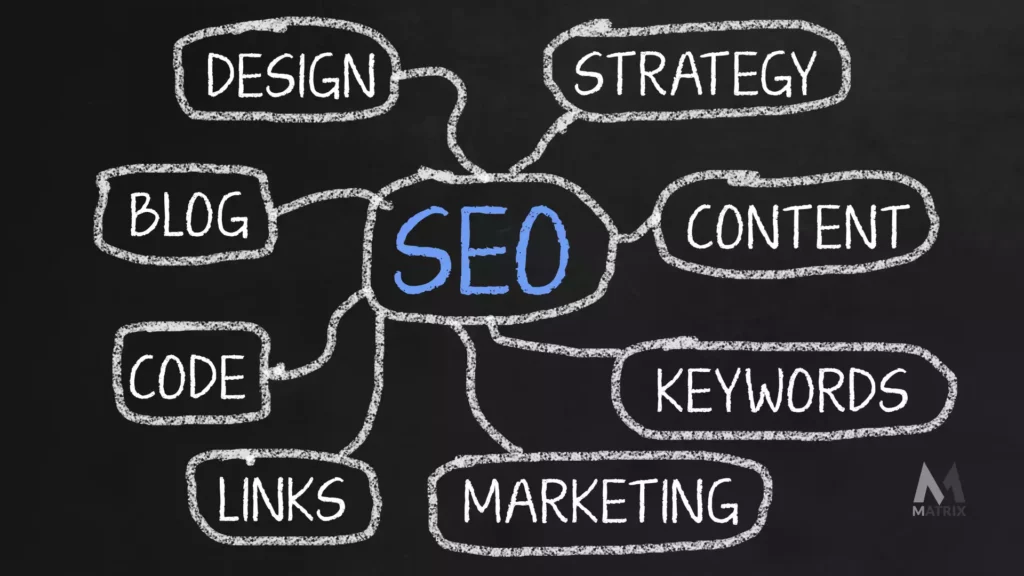
SEO, or search engine optimization, is improving the ranking of a website on search engines. A good SEO strategy can help your website attract more visitors and customers. This article will discuss the steps you need to take to create a successful SEO strategy for your business and get results in 90 days or less.
So, what is SEO, exactly? SEO is the process of optimizing a website for search engines. This can be done by incorporating keywords, metadata, and internal links into your content.
SEO is not just about optimizing a website for search engines, however. It’s also important to focus on creating high-quality content that will appeal to users. This content should be well-written, relevant, and shareable.
By following these steps, you can create a successful SEO strategy for your business and get results in 90 days or less.
- Define Your Goals—The first step in creating an SEO strategy is to define your goals. What do you want to achieve with SEO? Do you want to attract more visitors to your website? Drive more sales? Increase brand awareness? Once you have defined your goals, you can create an action plan. This plan should detail the steps you need to take to achieve them.
- Conduct an SEO Audit – The next step is to conduct an SEO audit of your website. This will help you identify any areas where your website may be lacking. You can then improve these aspects of your site and make it more search engine-friendly.
- Focus on On-Page Optimization – Once you have completed an SEO audit, the next step is to focus on on-page optimization techniques. This includes incorporating keywords into your content, optimizing your site’s metadata, and internal linking.
- Engage in Off-Page Optimization – Another important component of SEO is off-page optimization, promoting your website on other websites and online platforms. This can be done by building high-quality backlinks from relevant websites and writing guest posts for relevant blogs or publications.
- Monitor Your Progress – The final step in your SEO strategy is to monitor your progress. This includes tracking your website’s ranking on search engines and the number of visitors and leads you generate. Regularly monitoring your progress can adjust your strategy and ensure you’re on track to achieve your goals.
Implementing an effective SEO strategy can help you attract more visitors to your website, drive more sales, and increase brand awareness. So what are you waiting for? Start planning your SEO strategy today! By following these steps, you can create a successful SEO strategy for your business and get results in 90 days or less.
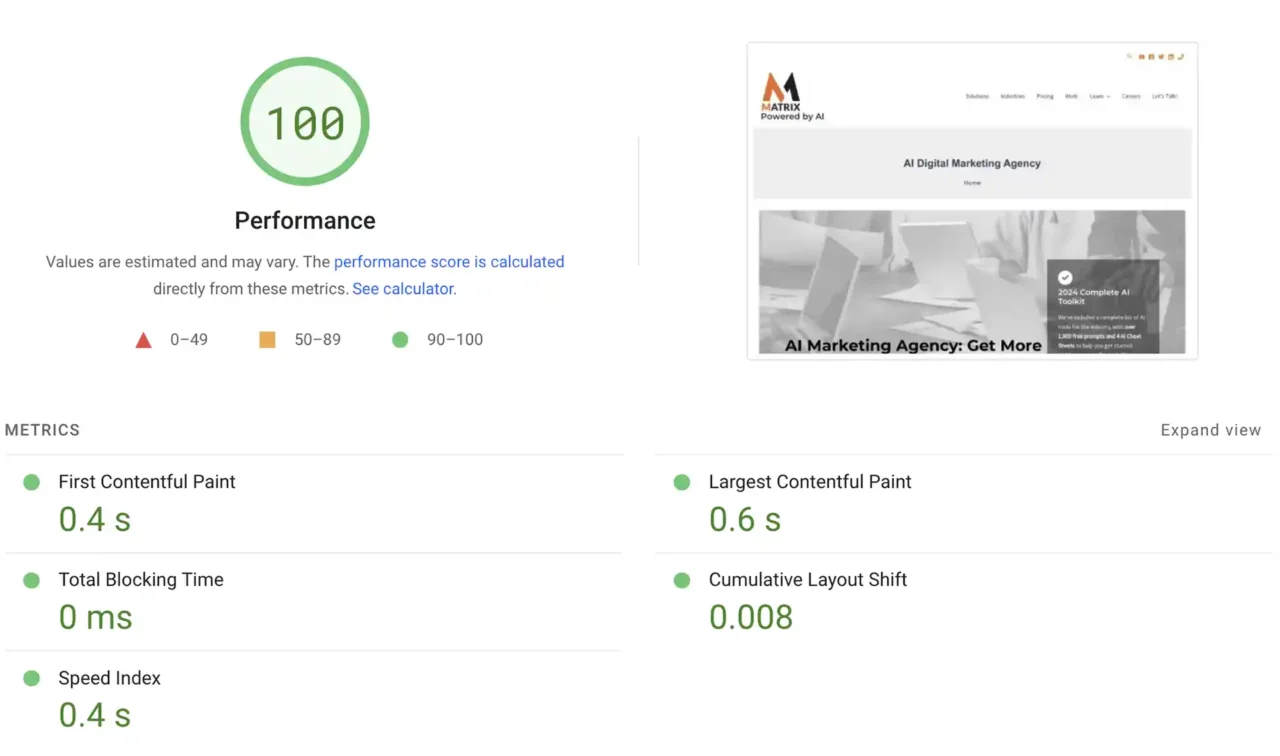
How to Increase Traffic to Your Website with SEO
If you want to increase traffic to your website, you need to focus on SEO. SEO, or search engine optimization, improves a website’s ranking on search engines. A good SEO strategy can help your website attract more visitors and customers.
So, how can you increase traffic to your website with SEO? Here are a few tips:
- Optimize your website for search engines. This can be done by incorporating keywords into your content, optimizing your site’s metadata, and internal linking.
- Promote your website on other websites and online platforms. You can build high-quality backlinks from relevant websites and write guest posts for relevant blogs or publications.
- Monitor your website’s performance and make adjustments as needed. This involves tracking your website’s ranking on search engines, the number of visitors it receives, and any leads or sales you generate.
By following these steps, you can increase traffic to your website through SEO and enjoy more exposure, higher ROI, and better results overall. So why wait? Start optimizing your site for search engines today!
You can use many strategies to drive more visitors to your site, including paid advertising, social media marketing, and content marketing.
Paid advertising is a great way to generate traffic to your website quickly. You can create and run ad campaigns using Google AdWords or Facebook Ads.
Social media marketing is another effective way to increase traffic to your website. You can use social media platforms like Twitter, LinkedIn, and Instagram to share your content and drive users back to your site.
Content marketing is a long-term strategy that can help you attract more visitors to your website. By creating high-quality, shareable content, you can build an audience of loyal followers who regularly visit your site. SEO for Professional Services Firms
Following these steps can generate more traffic to your website and improve its ranking on search engines.
Tips for improving your SEO strategy – IT’S NOT ROCKET SCIENCE

SEO is not rocket science but can get complex. I’m here to help take the complexity out and provide you with an SEO process to help you grow your traffic and get more conversions and sales. But, like all complicated topics, we’ll keep it simple and build an SEO foundation.
This 3-month SEO plan is not complicated, and you can do it. So, let’s dive in now.
Why should I have an SEO plan?
Search Engine Optimization (aka SEO) is about making your website compatible with search engines to recognize your content and rank it to other content on the Internet.
Please note that you should create content for your audiences to find, read, engage, and share. So, we must create our content for the user and structure for search engine algorithms.
HOW WILL SEO INCREASE TRAFFIC, CONVERSIONS, AND REVENUE
If you have a business online, you likely have a website where you want your target market to find and engage. You might ask why your target prospects are not reaching me via my website or why my website is not ranking on the first page of Google. These are great questions.
QUOTE: Over 70% of clicks go to organic searches that rank on the first page of Google.
We’ll show you a step-by-step SEO strategy and what you need to get a proven, simple SEO strategy running for your website.
Companies Waste Up to 40% of Their Marketing Budget on Poorly Targeted Campaigns
Poorly targeted marketing campaigns, including those driven by outdated data or vague buyer personas, can waste up to 40% of marketing budgets annually. This highlights the need for better data management and audience segmentation strategies. (HBR)
THE 3-MONTH SEO PLAN
We’ve outlined key points here, but download your free 3-Month SEO Guide for the step-by-step plan.
MONTH 1 – Research & Competitor SEO Analysis
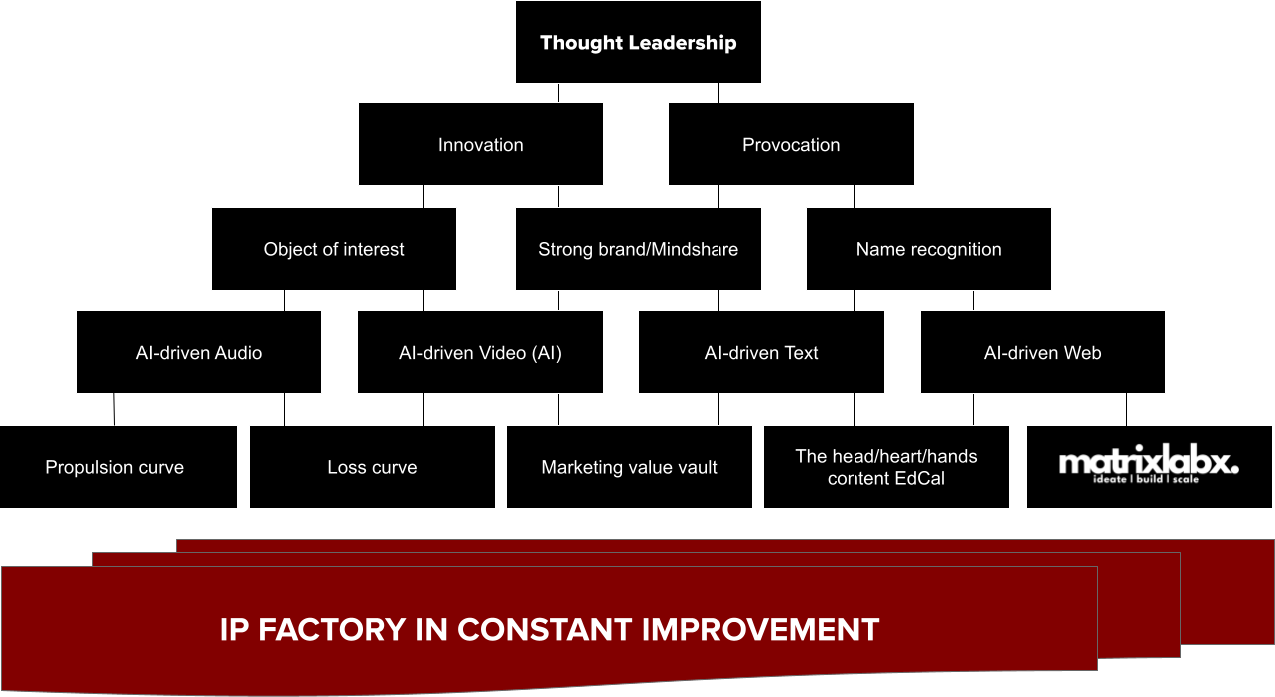
SEO plans and search results take time. A new business or a website with low domain authority can take up to 6-months before you see results. Therefore, selecting the right keywords is essential.
For example, Matrix Marketing Group offers SEO services, and when choosing a keyword, we chose’ Excel data analysis’. We write great content tuned for SEO and great search results, and our readers love it.
We are getting more traffic, but website traffic will not turn into customers for our SEO services. We selected the wrong keyword. This keyword, excel data analysis, did not align with our SEO service offering.
STEP 1
So, think about keywords related to your target audience and develop content.
To help determine keywords, think about what your target audience reads and in what mediums. Do they read blog posts, eBooks, White papers, Checklists, Infographics, and other educational content? Step back for a minute and think. Why are you reading this post about SEO strategies? How did you find this article? That’s the mindset you need. Think like a reporter. AI Digital Marketing Trends and Future for Matrix Marketing Group [Interview]
STEP 2
The next step is to research the keyword you picked and what your competitors are ranking for. We need some SEO tools. Here’s a list of FREE and PAID SEO research tools.
- Google Keyword Planner (FREE)
- Ubersuggest (PAID)
- SEMrush (PAID)
- Ahrefs (PAID)
- MOZ (PAID)
Follow this SEO approach once you have accessed these tools and familiarized yourself with them.
Add your keywords from the spreadsheet into the tools and look for these elements:
- Relatively high search volume
- Low competition
- High CPC (cost-per-click)
To help fine-tune your keyword research, we like to see what our competitors are doing. We do this to help us rank along with them, with the ultimate goal of ranking higher.
STEP 3
We use three tools to spy on your competitor’s keywords. SEMrush, ahrefs, and Google. We’ll use SEMrush as an example and follow this process.
- Go to SEMrush and type in your URL to list your closest competitors.
- If you already know your competitors (those who sell the same product or service as you do), type in their URL, and it will show you:
- All the keywords they are buying traffic for using paid ads on Google
- They are ranking for all the keywords on Google, which pages on their websites rank for those keywords, and how many visitors they get from those keywords.
- Knowing your competition’s success will tell you the main keywords/phrases to consider going after.
Now, that was easy, right?
STEP 4
Set up Google Console. It’s a free tool that breaks down how your website is doing. You won’t do anything else with this during month one, but you want to set it up early so it can begin tracking data for you to utilize in month two. (NOTE: If you don’t already have Google Analytics 4 on your website, you must set up Google Console.)
MONTH 2 – Optimize Your On-Page SEO and Building Content
What is On-Page SEO? On-page definition: SEO is all the internal factors that make a website and webpage useful for the visitor. SEO stuff like page titles with keywords, user-friendly URLs, meta description, internal linking, image alt text, and header tags like H1 and H2 for easy skimming.
In simple terms, Google reads source codes (not the language you and I speak or read!), so it’s your job to make sure Google can read our websites so that we can rank in its searches.
STEP 1
We use SEO tools like RankMath SEO plugin for WordPress websites and SEO Plug-In for Shopify websites. These plug-ins handle most of your on-page SEO activity. They are a must! It walks you through the steps (in a very user-friendly way) to make sure Google can read your pages.
Set up the free RankMath SEO Plugin on your WordPress site to optimize your on-page SEO. MathRank is a super user-friendly plugin that will handle most of your on-page SEO needs. Content Marketing Financial Firms
The plugin will walk you through how you can optimize your site. Scroll down to the bottom of each of your posts to find MathRankarea. HINT: You want both “Readability” and “Keyword” circles to be green.
We suggest you set up both Google Analytics and Google Console in month one. Google Analytics shows your website traffic, and Google Console shows you the keywords driving that traffic. You will find both of these free resources helpful to see what’s working on your site as you begin implementing your SEO strategies. Set a weekly task or calendar reminder to check your website traffic and the keywords driving that traffic.
STEP 2
To drive more traffic to your website, you need content. Building high-quality content consistently on your blog will drive more traffic. To drive more traffic to your website, you need content. You will be adding your keywords to the content you create. Here is a guide to help you implement when you write your blog posts/articles:
- Create one blog, article, video, or audio piece every week. (NOTE: Regarding SEO, video and audio content does not rank as well in Google, but they’re still great for growing relationships.) If you produce mostly video and audio content, have plenty of text-based content.
- Create engaging content for the viewer (Google can tell if you have an engaged viewer on your website because they spend more time scrolling, clicking, and looking at images.)
- Write in a conversational tone.
- Create thorough content (NOT short), about 1,600 words or more
- Use sub-headings
- Keep paragraphs short (4-5 lines)
- Use images, videos, and audio clips where appropriate
- We suggest all blog posts have a conclusion and end with a question
Marketing is evolving. The world moves faster every day, and marketing teams are under pressure to deliver personalized, impactful campaigns at lightning speed.

MONTH 3 – Building Links and Getting Social Shares
The final part of this 3-month plan also includes what is known as off-page SEO. What is Off-Page SEO? If you Google the phrase “off-page SEO,” here’s the definition Google shows in the SERPs:
Social sharing builds social proof, which creates awareness and authority. We use this off-page SEO strategy to amplify, gain social shares, and gain engagement for our marketing content. Social sharing will not directly affect your SEO, and it has an indirect impact by increasing website traffic.
Links from other people’s websites to yours, called backlinks, can boost your SEO and ranking. Google loves seeing links, but not just any links. Google’s algorithm is smart and knows the domain authority and relevance of where those links originate.
Therefore, who will Google give more credibility to if you are linked to a very well-known authority in your industry versus someone who doesn’t have much authority or doesn’t have much to do with your field? If you guessed the one with higher authority, you guessed right.
STEP 1
Get other sites linking to your content.
- Start with a goal of getting 10-20 backlinks per month
- Authority links: Links from people/websites with authority in your niche space
- Relevant links: Links from similar sites in your niche space
STEP 2
Locate potential authority websites that can provide authority links back to your site.
- Go to ahrefs and put in your competitor URLs (not just the main URL, but the exact page with content similar to what you have created). Ahrefs will list every site linked to your competitor’s content. Now, that was easy.
- Take the list, line by line, and email the site owner, asking them to link to your content. Of course, you need to give them a good reason to, so you’ll want to provide them with the competitor’s article link that they had linked to and tell them how your content is similar, yet different (aka better), and how it can serve their reader well. This is a tedious task but worth your time and effort. So get started.
STEP 3
You should encourage social sharing. Social shares do not directly affect SEO, but they help because the more people who share, the more traffic, eyeballs, engagement, and the likelihood that others will link to your content.
- Have social sharing buttons on your site.
- Encourage your website viewers and social channel followers to share your content. Sometimes, people need to be asked.
- We use Google tools to find out who’s sharing similar content and ask them to share your content (only ask if it is relevant to their audience’s needs). Buzzstream is another great tool we use for this activity as well. SEO for Financial Services – Marketing for Finance Companies
Conclusion
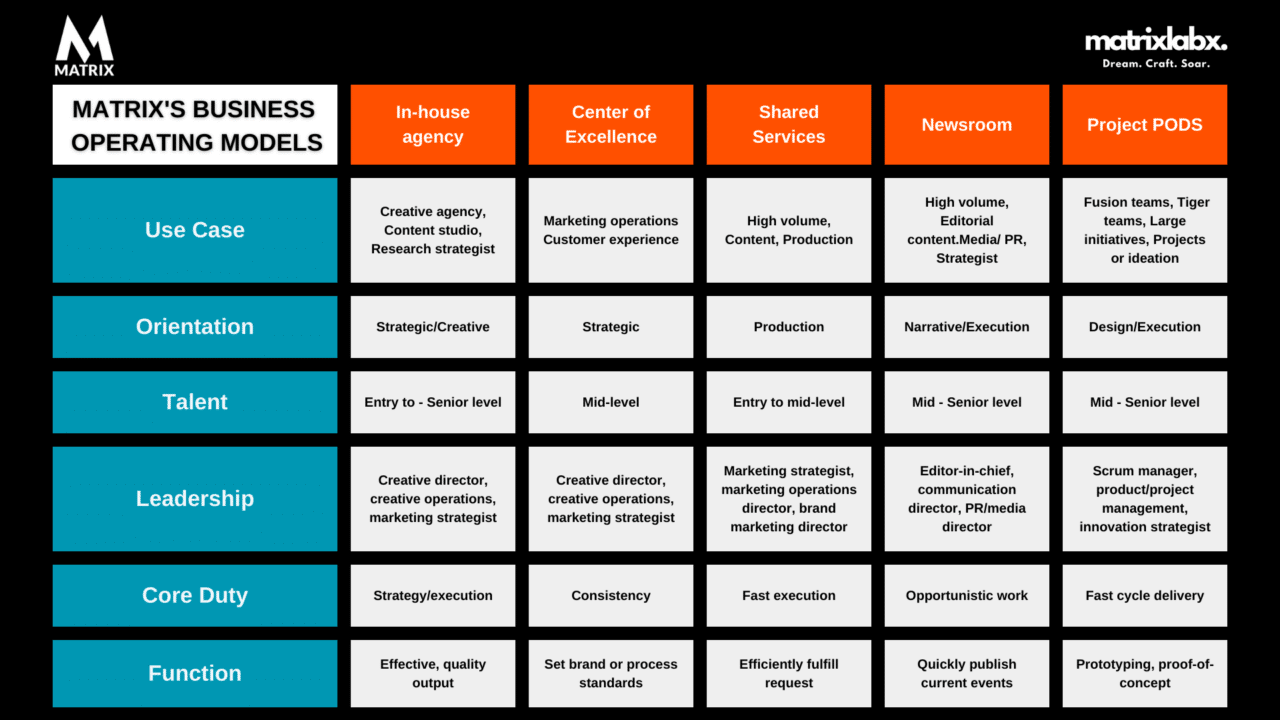
I hope you find this step-by-step SEO strategy guide useful. We’ve broken down all the steps for you to understand and implement within three months. If you want an SEO strategy plan PDF, let us know.
General FAQs
What is an SEO plan?

An SEO, or search engine optimization, plan is a roadmap for improving the ranking of a website on search engines. A good SEO strategy can help your website attract more visitors and customers. This article will discuss the steps you need to take to create a successful SEO strategy for your business and get results in 90 days or less.
What are the benefits of SEO?

Optimizing a website for search engines can increase traffic, leads, and customers. In addition, SEO can help you build brand awareness and credibility and ultimately improve your bottom line.
What is the difference between SEO and SEM?
Search engine optimization (SEO) improves a website’s ranking on search engines. Search engine marketing (SEM) uses paid advertising to improve a website’s ranking on search engines. SEM is more expensive and faster than SEO but can also be riskier. SEO is less expensive and typically takes longer to achieve results, but it can also be a more sustainable approach in the long term.
Is SEO worth the investment?

SEO is an investment that can yield a high return on investment (ROI) if done correctly. The key to getting the most out of your SEO investment is to partner with an experienced and reliable SEO company that can help you establish and execute a successful SEO strategy.

